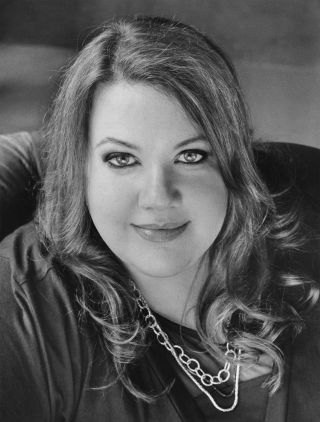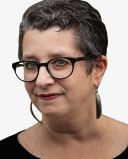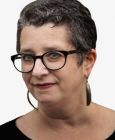Body Image
5 Questions for Sarai Walker
Her first novel, DIETLAND, looks at fat from a different point of view
Posted May 24, 2015

Sarai Waker's debut novel, Dietland, is a fierce, funny, and somewhat farcical exploration of fat acceptance, feminism, and the weight-loss industries. I love its energy, its anger, and its humor, and the way she confronts some of the mixed messages women get around body image and behavior. Walker, who has an MFA from Bennington, was kind enough to answer a few question about the book and her writing for readers of this blog.
Harriet Brown: Though I’m sure you will be asked this question a million times, I too must ask: What series of events/thoughts/life experiences inspired this novel?
Sarai Walker: The road to Dietland was a long and windy one. The first time I knew a novel was inevitable was after I saw the film Fight Club many years ago. I loved its angry, defiant, punk spirit. I felt that this kind of narrative was usually reserved for men and so I vowed to write something like this for women. I had absolutely no idea what the novel would be about, but the impulse never left me.
A few years later, I wrote a short story about a young fat woman who works at a teen magazine, a experience that was close to me. I had never written about the experience of being fat before — it was risky, but also exhilarating. Once I finished writing the story, I knew it should become the heart of the novel I’d been thinking about writing. I merged this with the Fight Club idea and that’s how Dietland was born.
HB: Your heroine, Plum Kettle, struggles with body image. Like many women she’s a serial dieter and self-loather. Why was it important for you to have a protagonist who didn’t fit the “normal-size” mold?
SW: I prefer to write from the perspective of someone on the margins, since that’s the place I occupy in society myself. I don’t want to write from the perspective of “beautiful people” — that doesn’t interest me. And in a novel that takes on our obsession with weight and beauty, a protagonist who is an outsider is ideally placed as an observer and critic. Fat women are always treated like outsiders. In the novel, I think Plum comes to value this perspective, to see it as a good thing. The feminist writer bell hooks has written about the margins as a place of power. I like that idea.
HB: Me too! Many women of your generation avoid the f-word—and by that I mean “feminism.” They shy away from labeling themselves feminist. Do you call yourself a feminist? Do you have any ambivalence about this identity?
SW: Growing up as a Gen Xer, I recall feminism being more stigmatized than it is now. It seems there’s been a real shift in recent years with younger women embracing the term in a way that wasn’t the case when I was coming of age. I teach university students and they don’t seem daunted by the word. Perhaps the bigger issue now is the debate over what feminism means. After all, anyone can call herself a feminist. That’s an important step, but it’s really the easy part.
I am a proud feminist and it’s a big part of my identity. I have no ambivalence about this identity, but I do feel troubled by the way that feminism has shifted in certain ways. For example, I write a lot about the sexual objectification of women, and criticize this wherever it occurs, from fashion magazines and pop music to pornography, but there are feminists who want to reclaim this objectification as “empowering.” I think we have to be leery of any kind of feminism that simply reframes sexist norms. We have to ask ourselves whose interests are ultimately served.
HB: What responses are you hoping to provoke in readers? What responses are you nervous about provoking?
SW: I’ve learned that what readers take away from the novel varies wildly. However, there are two kinds of responses I’ve received so far that I really like. I’ve heard from readers (usually women, but not always) who’ve said that reading Dietland changed the way they see their body and even the world around them. I’ve also heard from thin readers who’ve told me that before reading Dietland, they never really understood what fat people experience in our culture. Both of these responses are evidence of “consciousness-raising” (to use a retro feminist term!), which means coming to see the world around you differently. I am thrilled to receive responses like this.
I’m not necessarily nervous about any particular kind of response, although I do anticipate being attacked for the fat positivity in the book. So many people, even so-called liberal people, become absolutely enraged when anyone challenges the “fat is bad” mentality. It’s really a taboo.
HB: It is a topic that seems to provoke rage in many readers. I've experienced that myself. So, last question: If you had daughters, what advice would you give them about feminism, body image, and being a woman in 21st-century America?
SW: That’s a tough question. In Dietland, Plum’s mom discourages her from dieting and actually tries to forbid her from doing it, telling her she’s beautiful as she is. Yet despite coming from this supportive family, Plum is filled with self-hatred and desperate to lose weight anyway. The sad truth is that we live in a toxic culture and it’s impossible to shield girls from this. Of course, Plum’s life would have been even worse if her family hadn’t supported her and tried to instill positive self-esteem, so this is obviously essential. I also think it’s essential that we model body positivity in our own lives, since all the good advice in the world won’t mean anything if girls see us dieting and obsessing over unrealistic ideals.
Ultimately, though, our culture is more powerful than any of us individually, so we need to work together collectively to change it.
HB: Amen to that.
Dietland is available on Amazon and at bookstores. For more information, visit Sarai Walker's website.




